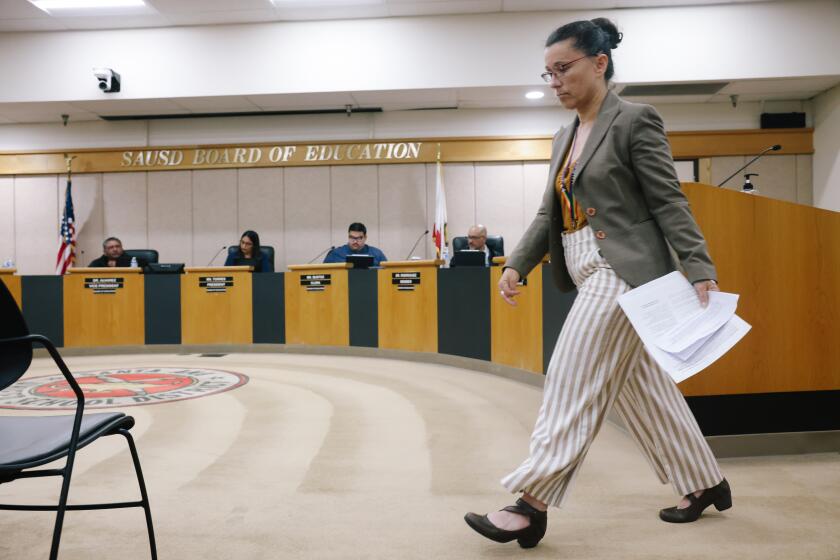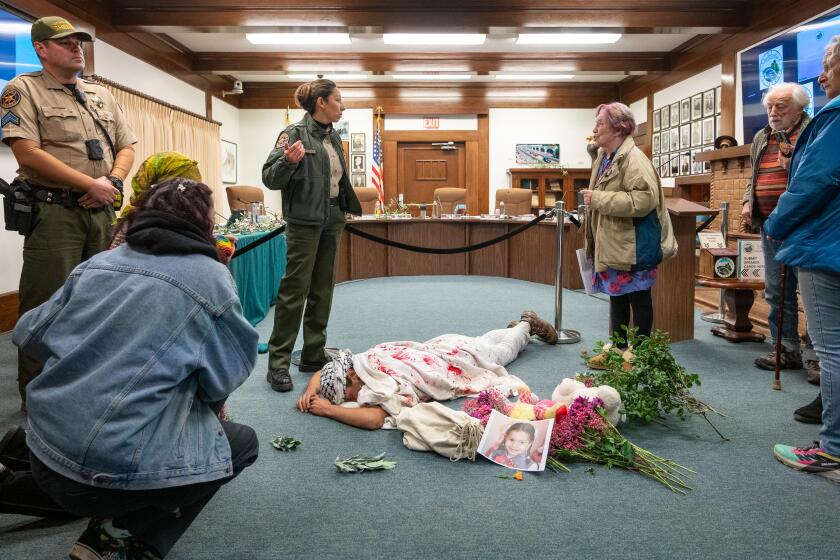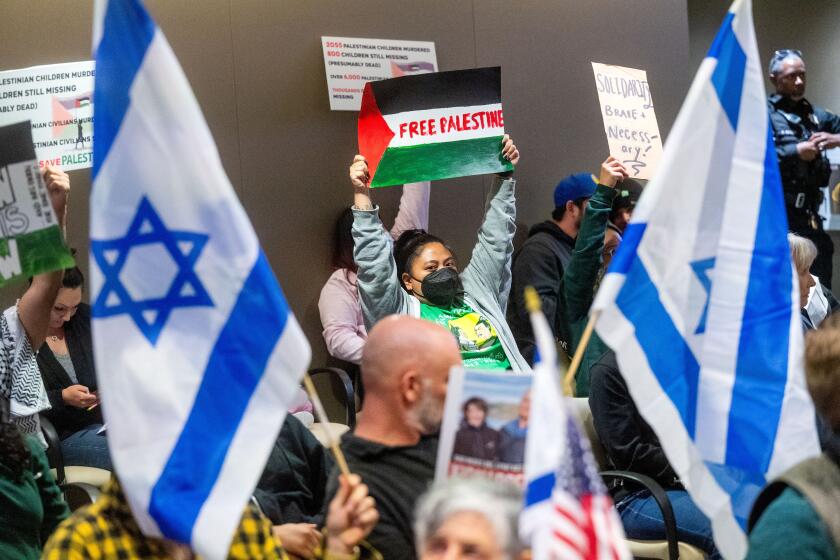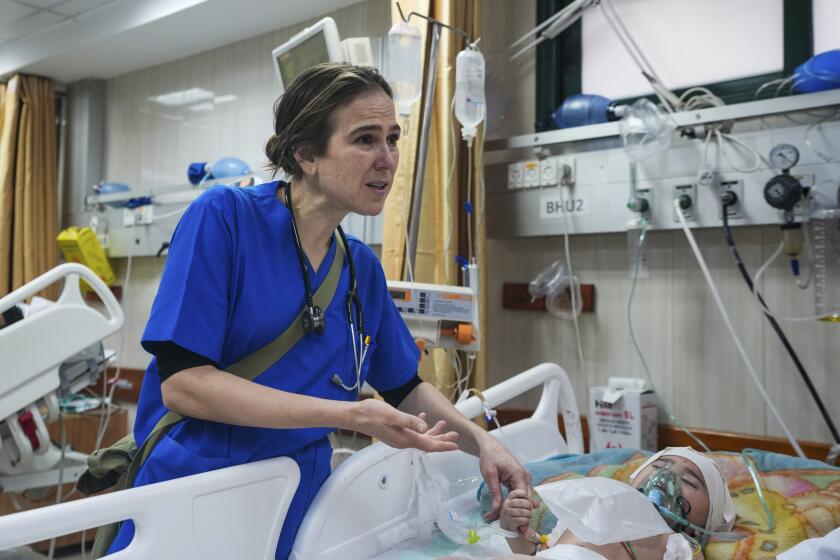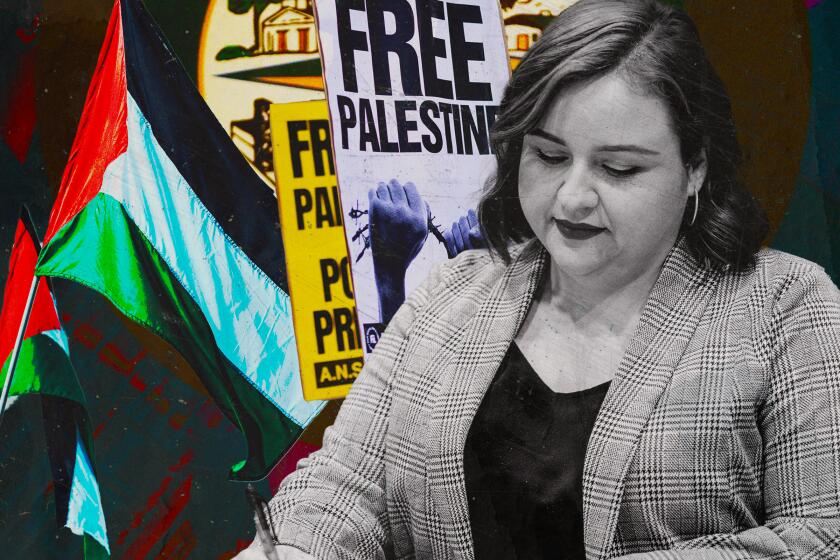California city council meetings stir up heated debate over calls for Gaza cease-fire
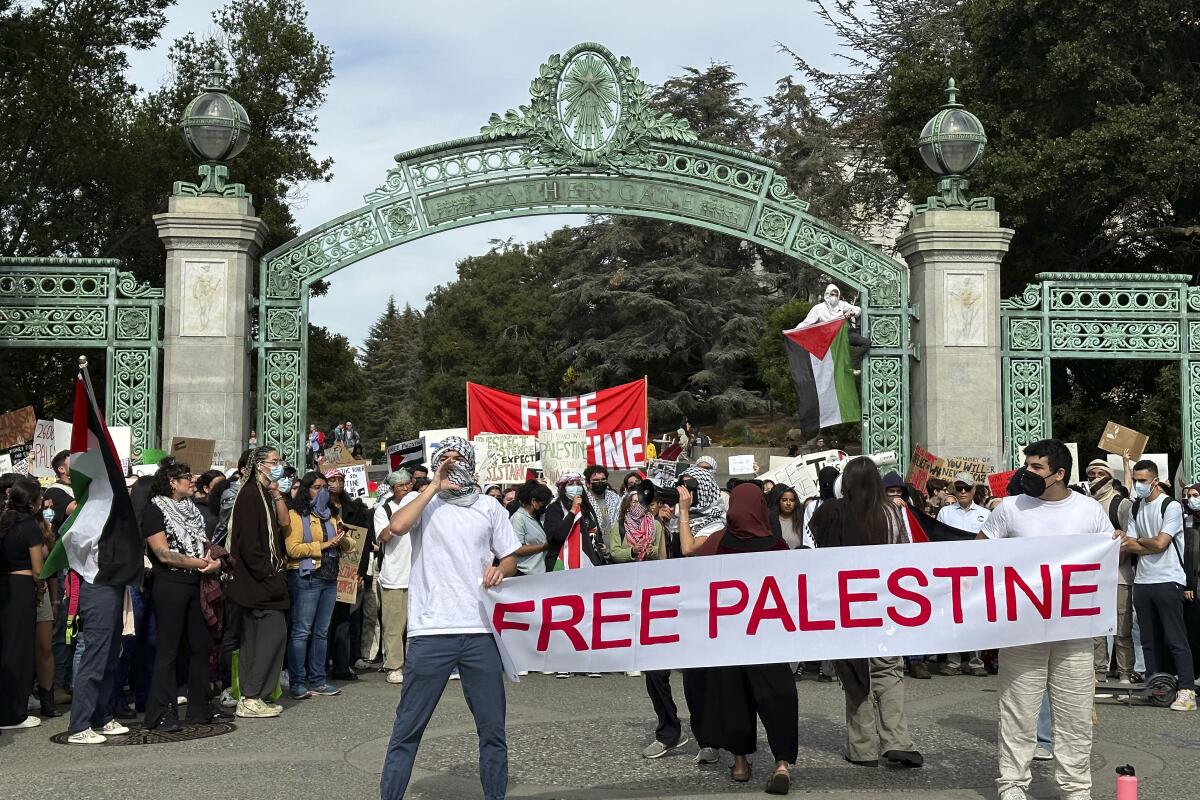
In the last month, the Irvine City Council has focused on the mundane, everyday decisions that typify local government.
Officials took steps to relocate a children’s museum to the Great Park and considered expanding transit options in the city, Orange County’s third largest. They agreed to put stop signs at a busy intersection near a neighborhood school, fulfilling a desire many residents have voiced for years.
But they’ve also grappled with an issue playing out more than 7,000 miles away: the Israel-Hamas war. The conflict has prompted an outpouring of concern from residents and a push for city leaders — more accustomed to weighing local budgets than international policy — to take action.
In the last few months, pro-Palestinian activists have packed city council meetings in Irvine and across California, urging elected officials in hours-long, often emotional and sometimes disruptive and chaotic testimony to call for a cease-fire between Israel and the militant group Hamas.
“We have reached the point of no return on this issue,” Hajar Yapici wrote in a letter to the Irvine City Council. “As our representative, you have a duty to keep us all safe. In times of crisis, that requires public statements and resolutions that reiterate the values that make Irvine one of California’s greatest cities and affirm that Irvine will always be a champion for peace and understanding.”
Public meetings across the state have become a focus for heated debate since Hamas militants attacked and killed more than 1,100 people in Israel and took about 250 hostages on Oct. 7. More than 30,000 people have been killed in Israel’s subsequent retaliatory military campaign in the Gaza Strip, according to health authorities there, many of them women and children.
“The local repercussions of this war are just bigger than we’ve seen in the history of the conflict,” said Alon Burstein, a visiting professor of political science at UC Irvine. “We’ve always seen ricochets and rise of antisemitism and Islamophobia when these cycles erupt, but never anything on the scale we’re seeing now.”
An Orange County school district’s efforts to introduce lessons on the Israeli-Palestinian conflict have ignited emotional discourse among Jewish and Arab American community groups.
Irvine Councilmember Tammy Kim said she’s never seen residents so divided.
While pro-Palestinian organizations and their allies have led the push for local leaders in Irvine and elsewhere to take a stance, many members of the Jewish community and other residents have also appeared at meetings, urging they focus on running the city.
“I’m trying to do the work of the city,” Kim said during a meeting in February where a resolution was discussed. “I want to make it extremely clear that my heart goes out to everyone. Every single human being in this room craves for peace. While my desire to end the war is unwavering, I do understand my limitations as an individual to do so.”
Dozens of city councils across the country have weighed in on the six-month war, with many calling for a cease-fire agreement — despite the fact that the will of local governments has little, if any effect on international policy.
One likely reason that these conversations are playing out locally, according to experts, is that people feel somewhat powerless over the devastation that’s unfolded throughout the conflict. They want to take action so they protest and go to their local governments to call for a cease-fire or some other action, Burstein said.
“Is a city council calling for a cease-fire going to result in a cease-fire between Israel and Hamas? No,” Burstein said. “But people feel because what is going on is touching them personally, emotionally and is following them psychologically — and touching on their identities on the other side of the world — they have to do something.”
Ojai is half a world away from the Gaza Strip. But the eclectic tourist town has been rocked in recent weeks by increasingly brazen protests over the brutal war between Israel and Hamas.
The City Council in Ojai passed a resolution calling for a cease-fire in late February, following weeks of protest that included a man soaked in fake blood pretending to die on the floor of City Hall.
Last month, Santa Ana city leaders became the first in Orange County to pass a resolution calling for a cease-fire. The resolution also called for the release of Israeli hostages and pointed out that it recognizes both a free Palestinian state and Israel’s right to exist.
Oakland adopted a similar resolution calling for an immediate cease-fire and release of all hostages in November, and San Francisco followed suit with its own declaration in January that additionally condemned both Hamas and the far-right Israeli government. Albany became the latest Bay Area city on March 25 to approve calls for a cease-fire.
Just weeks after the war started, Richmond was the first city in California, if not the country, to pass a resolution in support of the Palestinian people. The resolution, in addition to declaring solidarity with Palestinians and condemning the humanitarian crisis, accused Israel of “ethnic cleansing” and “engaging in collective punishment” against the people of Gaza.
The city of Richmond voted to support the Palestinian people in Gaza with a controversial resolution after a marathon City Council meeting.
Some cities have declined to weigh in on the conflict, even with the regular presence of protesters.
Berkeley has resisted taking up a cease-fire resolution, but on March 26, pro-Palestinian protesters disrupted a City Council meeting that included an agenda item to vote on the annual Holocaust Remembrance Day program that honors survivors.
Protesters chanted “From the river to the sea,” which some consider a cry for the liberation of the Palestinian people and others a call for the end to Israel. One woman called council members “traitors to this country” and “spies for Israel.” Others called council members “murderers” and “racist Zionists” who support apartheid and genocide.
“I am outraged over the hateful and deeply antisemitic behavior we saw at Tuesday’s Council meeting,” Berkeley Mayor Jesse Arreguín wrote on social media in response to the protesters. “Heckling people including Holocaust survivors, then co-opting its message for an anti-Jewish agenda, threats and hate speech will not be tolerated. We will not be intimidated.”
An international team of doctors was prepared for the worst before visiting a hospital in central Gaza.
Basim Elkarra, executive director for the Council on American-Islamic Relations in the Sacramento Valley and Central California, said that while cease-fire resolutions are mostly symbolic, they are meaningful for locals who feel devastated by the war and disappointed by the lack of greater support for a Palestinian state by the Biden administration.
“Our community feels very guilty that our taxpayer dollars and this administration is helping carry out this genocide,” said Elkarra, who has lost more than 75 family members during the war.
“When hundreds of cities around the country come out with cease-fire resolutions, it keeps the pressure up,” he said. “And that pressure trickles up. It goes from the city councils to the state legislature, from the state legislature to our members of Congress, to our governors. The more elected officials that come out and support a cease-fire and keep the pressure on Biden, the better.”
But others see the local-level resolutions as more harmful than helpful.
Jonathan Mintzer, director of external relations at the Jewish Community Relations Council in the Bay Area, said the resolutions and surrounding public debates often stir up hateful rhetoric and deeper division.
Mintzer said he’s witnessed protests at city council meetings where demonstrators said that Hamas’ attack on Israel was justified or that it didn’t happen at all.
“We knew this would happen, and we’re trying to tell city council members that this is not the direction to go. Use your platform. Use your voice. Attend rallies. But bringing this into the public sphere is inherently damaging to the Jewish community,” Mintzer said. “People are just using these forums to spew hate.”
Some local officials are attempting a more measured approach in efforts to avoid the division.
In late February, Irvine Mayor Farrah Khan and Vice Mayor Larry Agran put forth a resolution that addressed the effects of the war but stopped short of calling for a cease-fire. The resolution aimed to promote the city as a safe space for free speech, work with local schools to promote safety for students, enlist human relations organizations to initiate community meetings to bridge differences and facilitate humanitarian relief once a cease-fire is in place.
One side of the City Council’s cavernous chambers was filled with members of the Jewish community, some of whom spoke about a rise of antisemitism. The other side was packed with Palestinian state supporters, some of whom held signs calling for an end to the war. At one point, arguing between the two groups grew so loud that Khan chastised the crowd and called for a recess. The council did not approve the resolution.
“The local level is one of the only places where our residents have an opportunity to be heard, and we provide that public setting,” said Khan, adding that she personally would support a cease-fire resolution. “They don’t have that opportunity with state legislators. They don’t have it with federal ones. So they show up at the local level, and it’s our job to provide that space for them so they are heard.”
Each Sunday in Irvine, pro-Palestinian activists pack the sidewalk along Culver Drive — one of the city’s main thoroughfares — holding signs that read “Free Palestine” and “Stop the genocide.”
They’ve led demonstrations along other streets and outside the city’s massive outdoor mall, Irvine Spectrum. Some have said they plan to rally outside public officials’ homes.
Protesting is one of the few visible ways they can voice their support for the people affected by the war and urge U.S. officials to take action, they say. But the demonstrations — and the concern that they could get closer to the city’s oft-celebrated sleepy neighborhoods — have prompted consternation among some residents and officials.
Cudahy is the first city in Southern California to support the Palestinian people of Gaza with a resolution that calls for a cease-fire.
The situation has grown so heated that Councilmember Kathleen Treseder proposed an ordinance last month that would prohibit targeted picketing within 300 feet of a home. Santa Ana considered a similar resolution after a series of protests outside the home of Democratic Rep. Lou Correa, but did not approve it.
The Irvine ordinance would apply not only to city officials, but also other residents who have spoken out about the war and are worried about protests popping up outside their homes, Treseder said.
Activists fiercely oppose the proposal, calling it a violation of their 1st Amendment rights and a way to stifle speech that elected officials don’t agree with.
In a letter to the City Council, Irvine resident Julie Boualam accused Treseder of engaging in “inflammatory rhetoric” that undermines “the principles of inclusivity and respect that should guide our public discourse.”
The ordinance is expected to be considered in May.
“People come to Irvine, they want peace and quiet in their homes. They don’t want somebody picketing their neighbor,” Treseder said. “It’s not a good way to run a government — by threat.”
More to Read
Sign up for Essential California
The most important California stories and recommendations in your inbox every morning.
You may occasionally receive promotional content from the Los Angeles Times.
